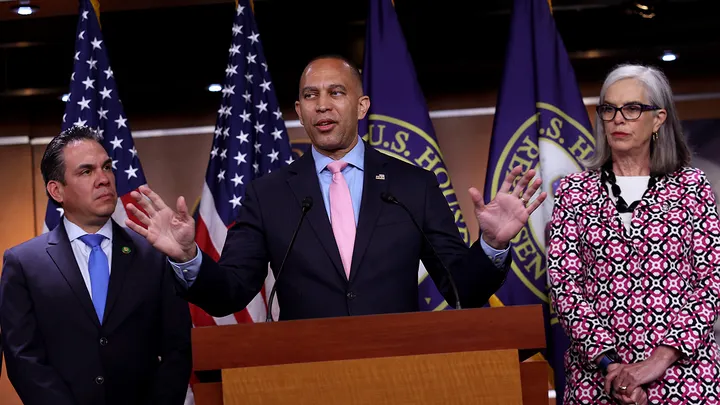The spending bill for 45 days is called a “short-term spending bill.”
The House of Representatives moved Saturday to pass a short-term spending bill to avoid a government shutdown if the Senate also passes the measure.
Now, the bill is going to the Senate. If it’s done quickly, Congress might just be able to escape letting thousands of federal workers go on unpaid leave and stopping non-essential government services.
After the short-term bill, called a continuing resolution (CR), passed the House with a vote of 335 to 91, members from both sides of the aisle applauded.
The funding patch will last for 45 days after the end of the fiscal year, which is at midnight on Sunday, October 1. Speaker Kevin McCarthy, R-Calif., said on Saturday that the bill also includes the $16 billion in emergency help for the U.S. that President Biden asked for over the summer.
It comes after House Republicans tried and failed to pass a separate short funding bill with conservative policy ideas like border security and budget cuts. Early in September, the national debt hit $33 trillion for the first time in history. This made Republicans worry even more that government spending is out of control.
“We need more time to get the job done,” McCarthy told reporters before the vote. McCarthy said he didn’t want to “punish” people in the military or at the border for the House’s failure to pass a budget that stops wasting money and improves border security.
“The House is going to do something to keep the government from shutting down. McCarthy also said, “We will put a clean funding stopgap on the floor to keep the government running for 45 days so the House and Senate can do their work.” “We will also put the extra money the president asked for in disaster, knowing what happened over the summer with the disasters in Florida, the terrible fire in Hawaii, and the disasters in California and Vermont.”
Republicans’ past CR plans didn’t get any backing from Democrats and failed because enough Republicans were against them. Holdouts said that a CR on principle is an extension of the goals of the last Congress, which was controlled by Democrats, and that it goes against the House GOP majority’s plan to pass 12 separate spending bills in the next fiscal year that lay out conservative priorities.
But most politicians on both sides agree that they need some kind of fix to give them more time to figure out how to make deals. The current fiscal year ends tonight at midnight. If the House and Senate can’t come to a deal, thousands of government workers will be sent home and “non-essential” federal services will stop.
Even though Democrats want a “clean” CR, it’s not clear if they will back the bill the GOP is putting forward right now.
Rep. Andy Barr, R-Kentucky, told Fox News Digital that he thinks Democrats will vote against the CR to hold out for the Senate’s plan, which includes funding for Ukraine help, something that most House Republicans are against.
Barr said, “I think this might fail because Democrats in the House want a CR from the Senate.” “So, what could happen is that this gets a low number of votes…There will be Democrats who vote to shut down the government. And that’s exactly what you’ll see. Democrats want to make this a political issue, so they will vote to shut down the government.
When he talked to reporters before the vote, House Democratic Leader Hakeem Jeffries, D-N.Y., wouldn’t say where he stood, but he did say that Republicans “dropped this on us in the 11th hour.”
Jeffries said that House Republicans “lied every step of the way.”














